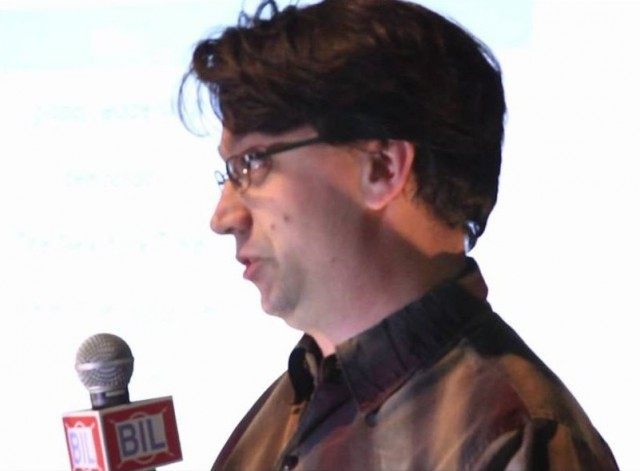What do you suppose is more likely to get you banned from a tech conference: Endorsing violence against your political opponents? Or writing abstract blog posts critical of egalitarian theory?
Contentious as the latter may be, common sense tells us that it is much less troublesome than the former. But common sense seems to be in short supply at Strangeloop, an annual tech conference in Missouri.
Earlier this month, we reported on Strangeloop’s disinvitation of Curtis Yarvin, a software engineer who also writes political tracts under the pen name “Mencius Moldbug“. Although Yarvin was booked to give a purely technical presentation, a number of complaints from people who objected to his political writings caused him to be disinvited from the conference. a decision that has attracted criticism from both liberal and conservative commentators.
The chief complaint of Moldbug’s opponents is his contribution to the “Dark Enlightenment” a movement of right-wing bloggers and Silicon Valley boffins who are known for their highly detailed critiques of age-old progressive values. Many of their conclusions, in particular their rejection of both egalitarianism and democracy, are highly controversial. Together with Nick Land, a former philosophy lecturer at the University of Warwick, Moldbug is seen as one of the founders of the movement.
Strangeloop has said that Moldbug’s views would be a “distraction” at the conference. But as I have discovered, many of of his critics hold views that are just as extreme —if not more so.
For example, Steve Klabnik, one of the attendees who pushed hardest for Moldbug’s disinvitation is a political radical who previously said he was “100% okay” with violence against his political opponents.
“Between GamerGate, Weev, and Moldbug, it’s not even a conservative tendency [in tech], but outright fascism” wrote Klabnik in October 2014. “I’m not sure what a ‘tech antifa’ movement would look like, but it’s sorely needed.”
One of Klabnik’s followers then pointed out that European “anti-fascist” movements tended to engage in political violence themselves.
“Yup”, replied Klabnik. “100% okay with that, personally.”
“The only thing fascists respond to is violence” he continued. “Ignoring them or letting them attack you doesn’t help.”
In other words, Klabnik appears to be “100% okay” with assaulting persons he considers to be fascist. He also employs a pretty loose definition of the word, including both Moldbug (who explicitly rejects fascism), as well as GamerGate (an overwhelmingly left-libertarian movement) within the label.
Klabnik’s comments raise serious questions for Strangeloop. The excuse given for disinviting Moldbug was the controversy caused by his political views (in reality, the “controversy” was just a few angry tweets). But Klabnik’s political views, which include an endorsement of communist principles, are no less radical. So why is Strangeloop singling out Moldbug?
I suspect there are two reasons. Firstly, Moldbug is associated with the reactionary right, and Klabnik is associated with the socially progressive left. In the trendy U.S. tech community, social progressivism is virtually an official religion. Those who doubt its principles, even in the unthreatening philosophical style of Moldbug, are heretics.
I also suspect that Alex Miller, the Strangeloop organiser who decided to cave to pressure from Klabnik and others, simply didn’t do his research. In his public statement, he admitted that he had not bothered to read any of Moldbug’s writings before making the decision to expel him. According to Miller, the complaints he received were enough to persuade him that Moldbug’s presence would be a “distraction” at the conference.
Predictably, it was Miller’s decision that ended up being the distraction. Far from setting the matter to rest, it flung Strangeloop into the center of an internet storm. Moldbug’s opponents will also be unhappy to learn that their efforts to ostracize him have backfired. In a demonstration of the ever-reliable Streisand Effect, Google searches for his name have skyrocketed since the controversy began.
Miller’s decision has attracted criticism from a wide range of quarters. JavaScript creator and former Mozilla CEO Brendan Eich — no stranger to political purges himself — criticised Strangeloop’s decision. Net security expert Meredith L. Patterson also intervened, arguing that Moldbug’s critics were misguided. In a display of growing bipartisan unity on free speech issues, the liberal Slate columnist David Auerbach and the conservative National Review also criticised Strangeloop, with Auerbach going so far as to suggest Miller ought to resign.
The real problem for Strangeloop is that they have endorsed the principle that a speaker giving a purely technical presentation can be banned from a tech conference on the basis of complaint alone. As noted by Auerbach in his column, this is effectively a heckler’s veto —and it opens the floodgates.
Moldbug has controversial opinions. Klabnik has controversial opinions. How many other Strangeloop attendees have controversial opinions? Why haven’t they been disinvited yet? Where is the consistency? Unless he reverses course, these are the questions Alex Miller is inviting us to ask.
Note: We reached out to Steve Klabnik for a comment before publishing this article. Responding, Klabnik told us “I have not called for violence against any person and do not condone it”. Perhaps he’s changed his mind? Or perhaps he thought his earlier tweets hadn’t already been archived. Who knows.

COMMENTS
Please let us know if you're having issues with commenting.